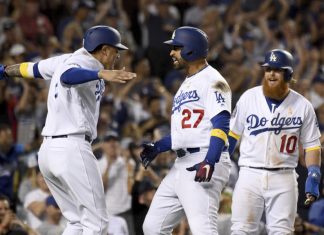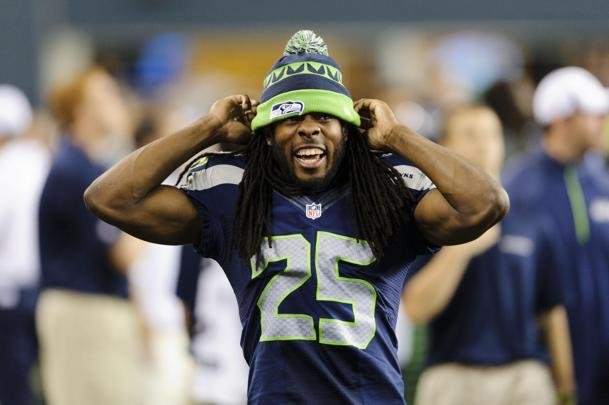HAVANA (AP) A lineup of Cuban baseball stars, including some of the most famous defectors in recent memory, made a triumphant return Tuesday as part of the first Major League Baseball trip to the island since 1999.
Los Angeles Dodgers outfielder Yasiel Puig, White Sox first baseman Jose Abreu and shortstop Alexei Ramirez and St. Louis Cardinals catcher Brayan Pena walked with a group of Major League Baseball officials and other players into the lobby of Havana’s soaring Hotel Nacional at the start of a three-day mission meant to warm relations between MLB and the Cuban system that has been drained by the loss of many of its best players to the U.S.
Puig, who fled to Mexico in a smuggler’s fast-boat in 2012 and then crossed the border to Texas, wrapped his childhood coach Juan Arechavaleta in a bear-hug, resting the side of his face atop the smaller man’s head.
”I’m very happy to be here,” said Puig, who had been barred from returning to Cuba until he was granted special permission for this week’s trip.
He declined to say anything more, but Arechavaleta said that none of Puig’s relatives, who live, like the coach, outside the southern city of Cienfuegos, was there to greet him.
Pena, who is from Havana, was met by at least 20 family members, who laughed at stories of the catcher’s life in America and handed him the phone to talk to relatives who hadn’t been able to make it.
The high-profile, official return of baseball defectors earning tens of millions of dollars a year in the Major Leagues is a landmark in Cuba’s relationship with the hundreds of players who have abandoned their country and the national system that trained them.
Under former President Fidel Castro, a passionate baseball fan who saw sports as an expression of national glory, defectors were barred from returning. Most were banished from official memory, never mentioned on Cuban television even as they made headlines on U.S. sports pages.
Castro’s brother and successor, President Raul Castro, has eased the treatment of players who leave as part of a broader easing of social controls. That included the 2013 removal of a required exit permit for all Cubans, except those considered essential to the country.
Some Major League players have been allowed back on low-key trips to see family. A few others, like star infielder Yoan Moncada, have received permission from Cuban authorities to depart legally to start careers in the United States. Moncada won a $31.5 million signing bonus with the Boston Red Sox in March.
Players sneaked off Cuba’s coast by smugglers in powerboats are a different matter. Their illegal departures have been treated until now as deep betrayals of the socialist system. Many have been banned from returning for eight years, like other Cubans who leave illegally.
The defectors’ return Tuesday was part of a rapid warming in relations between the Major League and Cuban baseball that has taken place since Presidents Barack Obama and Raul Castro declared a year ago Thursday that they were moving to reestablishment diplomatic relations.
MLB is hoping to return for an exhibition game during spring training, an idea that has progressed far enough for Commissioner Rob Manfred to recently pick the Tampa Bay Rays as the team that would make the trip.
U.S. teams played spring training games in Cuba before Castro’s revolution but none appeared here from March 1959 until the Baltimore Orioles faced Cuba’s national team in Havana in March 1999. MLB has not returned since.
The warming of relations is deeply complicated by the issue of the talent drain to the U.S. Cuban authorities appear to be struggling to find ways to slow the flood of baseball players to the Major League.
Peter Bjarkman, author of the upcoming book ”Cuba’s Baseball Defectors: The Inside Story,” said that he had counted 102 national-level players who had left Cuba this year, nearly a third of all those who have departed since 1980. It’s part of a broader wave of Cuban emigration sparked by the fear that the U.S. will cancel special Cold War-era privileges for Cubans as part of the broader warming with the island.
Cuba has been allowing some stars to legally play in countries such as Japan and Mexico during the off-season. Similar policies for the Major Leagues would be far more difficult due to the U.S. trade embargo on Cuba and Cuban fears that broad legalization of departures to the U.S. would make the talent drain even worse.
”I got the distinct impression that right now the Cubans have absolutely no idea of what they’re going to do. They’re in total chaos in this right now,”said Bjarkman, who spent much of the fall in Cuba speaking with people involved in the country’s baseball league.
Cuban baseball players generally go through a third country such as Mexico and declare residency that allows them to become free agents before signing a Major League contract with the highest bidder. If they come directly to the U.S., they would be subject to the MLB draft and likely sign a less lucrative deal.
Abreu, 28, signed with the White Sox for six years and $68 million in 2013. Limited to 72 games this season because of hamstring injuries, Puig hit .255 with 11 homers and 30 RBIs.
Puig’s case is infamous in the annals of Cuban baseball. Investigators and court documents say he was taken by boat from Cuba to a fishing village near Cancun, Mexico, and held by associates of the Zetas drug cartel before eventually crossing into Texas. In return, the financiers allegedly got a percentage of the seven-year, $42 million contract Puig signed with the Dodgers.
———
Michael Weissenstein on Twitter: https://twitter.com/mweissenstein
25% Bonus via Western Union













